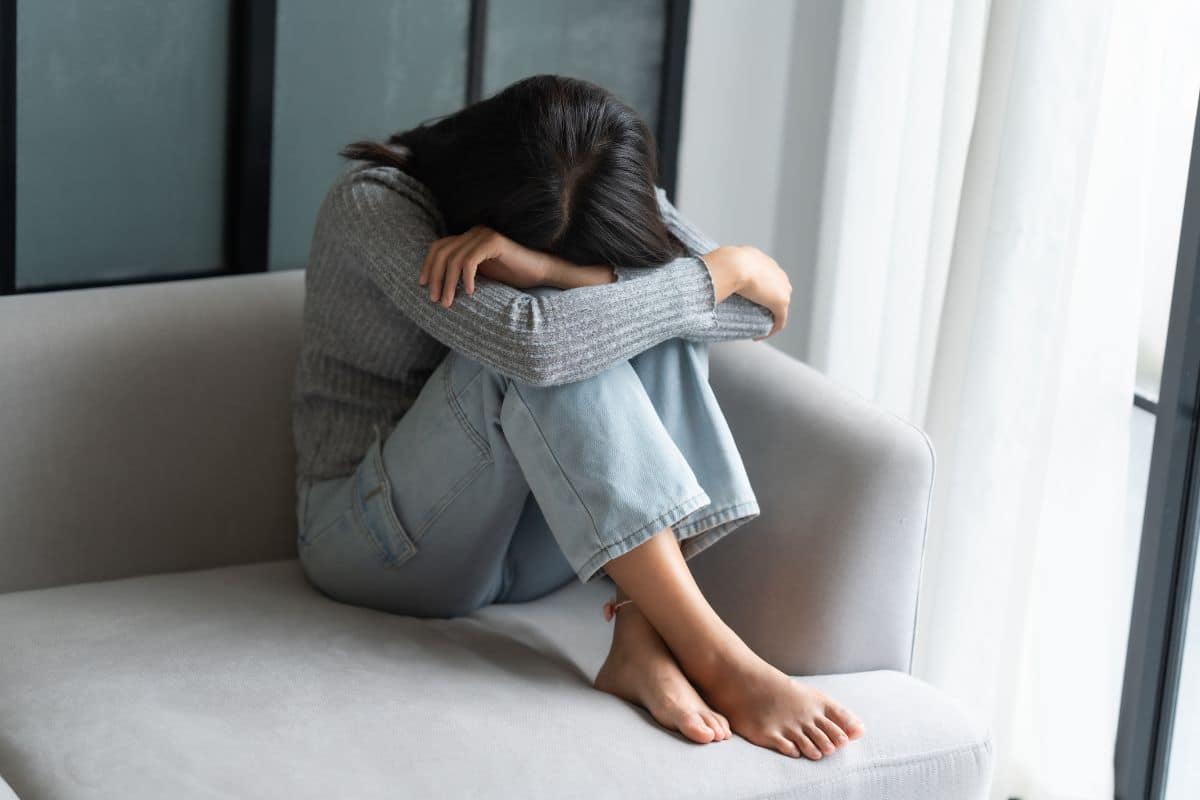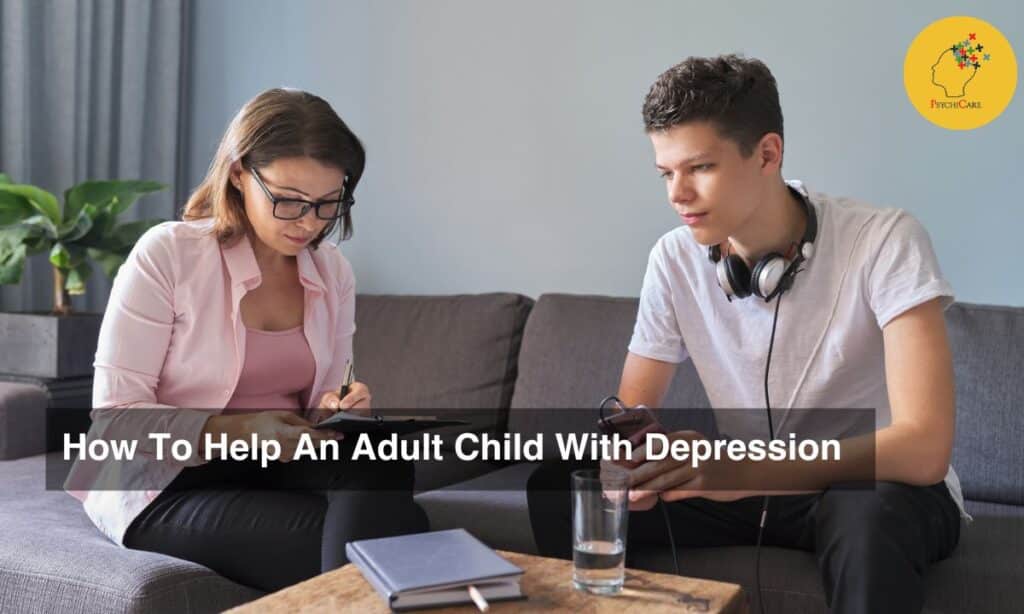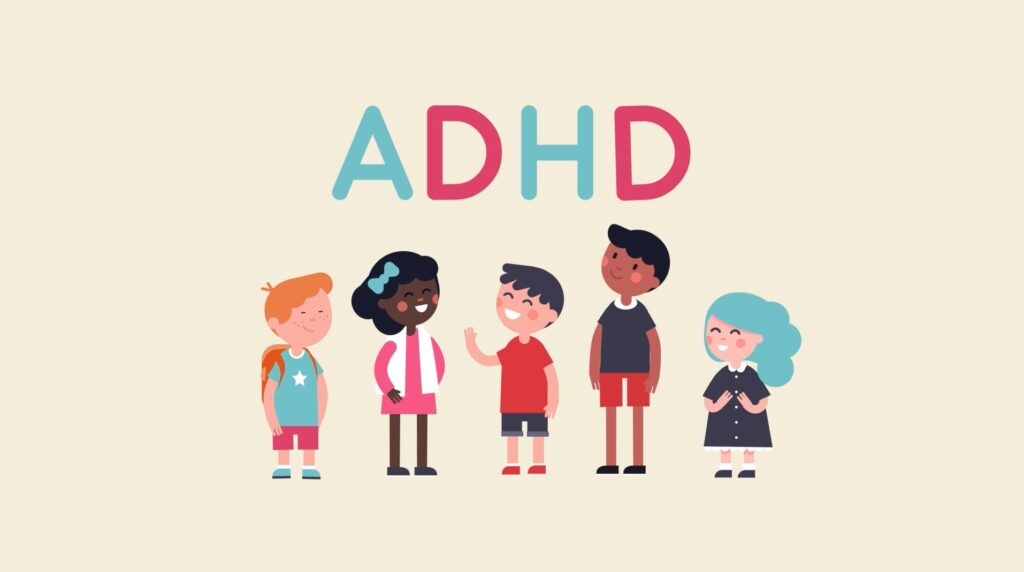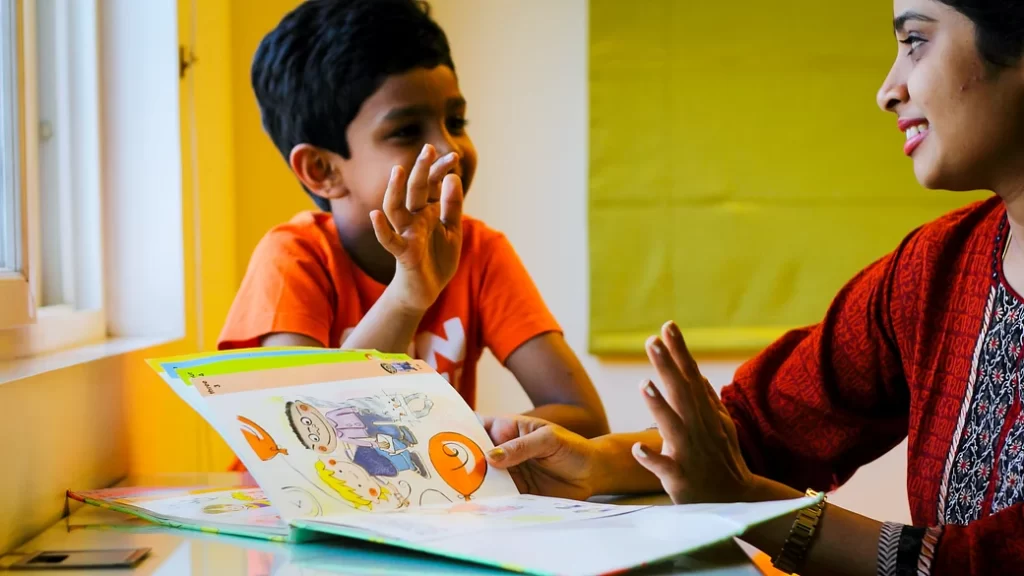Updated November 2025 — by PsychiCare Child Psychologists
As a clinical psychologist, I meet many parents who quietly admit they don’t know how to help their adult child with depression anymore. At 18, 21, 27, or even 35, your child is old enough to make their own decisions, and yet you can see they’re slipping, withdrawing, or losing the spark they once had.
This stage of parenting is complicated.
You’re expected to respect their privacy, trust their boundaries, and let them handle their own life. But you’re still a parent. You still notice the late-night calls, the empty eyes, the cancelled plans, the silence, the heaviness.
And that creates a painful tension no one prepares you for.
- You can’t parent them the way you once did.
- You can’t intervene the way you used to.
- You can’t force therapy or routines.
- You can’t simply “fix it” anymore.
Yet you also can’t sit and watch them fall apart.
Parents tell me every week:
- “I can see my adult child is depressed, but they won’t talk.”
- “I’m scared I’ll say the wrong thing.”
- “I don’t know how to help without crossing a line.”
- “I feel guilty for not doing enough.”
This guide is for you, the parent trying to figure out how to help your adult child with depression while still respecting their adulthood, their autonomy, and their emotional boundaries.
In the next sections, we’ll talk openly about why adult-child depression is different, the challenges you’re facing, and clear, expert-backed ways to support them without losing yourself in the process.
Why Depression in Adult Children Feels Different (and Harder for Parents)
Depression in an adult child is not the same as depression in a teenager. Parents often tell me they knew exactly how to help when their child was younger but now that their son or daughter is 18, 25, or 30, everything feels more complicated.
Here’s why.
They’re adults, but still your child
You’re expected to respect their privacy and independence, yet you can clearly see they’re struggling. This creates a silent conflict inside you:
How much support is enough, and how much is too much?
Depressed adults often hide how bad things are
Many young adults say things like:
- “I don’t want to stress my parents.”
- “I feel like a burden.”
- “I should be doing better by now.”
This shame makes them withdraw, shut down, or pretend they’re fine, even when they’re not.
Adult-life struggles feel like “failures,” not symptoms
When your 20- or 30-year-old can’t work, study, or function, they don’t see it as depression.
They see it as personal failure:
“Everyone else is moving ahead. What’s wrong with me?”
This makes them resist help and isolate even more.
You can’t step in the same way you used to
When they were younger, you could manage routines, book therapy, or step in directly.
Now, you can’t force anything, not treatment, not conversations, not behaviour.
That powerlessness is emotionally heavy for parents.
Your fear and their fear collide
You fear they’re slipping.
They fear disappointing you.
Both sides become cautious, and real communication disappears.
Understanding this emotional landscape helps you approach your adult child with compassion instead of pressure, which is the first step to helping them.
Different Age Groups, Different Struggles (18–25, 26–35, 35+)
Depression doesn’t show up the same way in every adult child. What a 19-year-old feels is very different from what a 32-year-old or a 40-year-old goes through. Understanding this helps you support them without misreading their behaviour.
18–25: The “Emerging Adult” Stage
This age group often feels lost, pressured, and unsure of who they are. Common triggers include:
- university or course stress
- first heartbreak
- failed attempts to “start adult life”
- loneliness after leaving home
- comparison with peers
Parents often see withdrawal, gaming, irregular sleep, or a lack of motivation.
These aren’t signs of laziness; they’re early symptoms of depression.
26–35: The Career and Relationship Pressure Zone
During these years, the world expects stability, job, income, a relationship, routine.
When things don’t go as planned, depression hits hard.
Common triggers:
- job burnout or repeated job loss
- unstable relationships or breakups
- fertility pressure
- financial stress
- feeling “behind everyone else”
Many adult children in this age group hide their struggles because they feel ashamed.
35+: The Silent Midlife Struggle
Depression in this group usually runs deeper and has been ignored for years.
Common triggers include:
- divorce
- parenting stress
- debt
- unresolved trauma
- feeling stuck in life
- pressure of “starting over” at 35 or 40
These adults may continue functioning on the outside, while collapsing silently inside.
The Real Problems Parents Notice When Their Adult Child Is Depressed
Parents rarely come to me saying, “My adult child told me they’re depressed.”
Most parents come because something in the atmosphere has shifted. Something that used to feel lively, predictable, or “normal” is suddenly gone, replaced by withdrawal, silence, or behaviours that don’t match who their child usually is.
Below are the real changes parents describe, the ones that make them search for how to help your adult child with depression long before any diagnosis is made.

1. Emotional Changes That Don’t Match Their Usual Personality
Parents often say:
- “She looks empty behind the eyes.”
- “He’s irritated all the time, and I can’t tell if he’s angry at me or himself.”
- “He used to talk so much. Now I get one-word answers.”
These emotional changes show up as:
- going quiet
- avoiding eye contact
- irritability without a clear reason
- crying in private
- emotional flatness, no excitement, no interest
- sudden sensitivity to small comments
These aren’t mood swings.
They’re invisible emotional injuries.
2. Functioning Starts Breaking Down in Small but Noticeable Ways
Parents don’t say, “My adult son has depression.”
They say:
- “He hasn’t eaten a proper meal in days.”
- “Her room looks like she’s given up.”
- “He sleeps all day. I don’t know if it’s exhaustion or escape.”
You might notice:
- their routine collapsing
- laundry piling up
- unopened mail
- skipping classes or work
- forgetting basic tasks
- reversed sleep cycle
- living on junk food or nothing at all
- avoiding showers
- living online instead of in real life
From the outside, these behaviours look like laziness.
Clinically, these are classic signs of executive dysfunction, not lack of willpower.
3. A Sudden Shift In How They Relate to You
Parents say things like:
- “I’m scared to ask her anything; she snaps or shuts down.”
- “I can feel him pulling away even when he’s right in front of me.”
Depression changes relationships in subtle ways:
- They avoid real conversations
- They become defensive around simple questions
- They read worry as judgement
- They apologise too much or get angry too fast
- They withdraw from family traditions or routines
It’s not disrespect.
It’s emotional exhaustion.
4. Financial and Life Responsibilities Become Too Heavy
Parents often quietly carry the load when their child begins to fall apart:
- paying rent “just for a few months”
- covering groceries or petrol
- helping with job applications
- managing bills they’re ignoring
- stepping in during crises, even when your child says they’re “fine”
This is usually when parents ask me:
“How do I help my adult daughter with depression and anxiety without becoming her only support system?”
5. A Trigger Event Changed Everything And They Haven’t Recovered
Parents often connect the dots in hindsight:
- the breakup
- losing a job
- moving to a new city
- dropping out of a course
- problems with a partner
- debt
- friendships ending
- social comparison
- burnout
After the trigger, their child wasn’t the same.
Not dramatic.
Just different, flatter, quieter, or “not fully present.”
6. Long-Standing Patterns Become More Visible During Depression
When an adult child becomes depressed, parents start seeing old wounds:
- fragile self-esteem
- a lifelong fear of failure
- trouble setting routines
- emotional shutdown during stress
- perfectionism that collapses under pressure
- unresolved trauma from childhood
- people-pleasing or avoidance
Depression magnifies the parts of them they’ve been hiding for years.
7. Real Parent Stories That Mirror What You May Be Seeing
These are real patterns from parents I’ve worked with and from online communities:
- A mother describing her 24-year-old son:
“He lives in his room. I hear him laughing at videos at 4 am and crying quietly at 7 am.” - A father about his 29-year-old daughter:
“She stopped picking up my calls. When she does, she sounds like she’s acting. Too cheerful. Too fast.” - A parent online about their 20-year-old:
“He only leaves the house for food delivery. I don’t think he’s seen the sun in weeks.” - A mother about her 31-year-old:
“She still goes to work, but when she comes home, she collapses emotionally. I don’t know how she’s holding it together.” - A father about his 22-year-old:
“He’s not lazy. He’s drowning.”
These are real behaviours and they’re all connected to depression, not character.
11 Expert-Backed Ways To Help Your Adult Child With Depression (From a Clinical Psychologist’s Desk)

1. Approach them as an adult, not as “your child,” otherwise they shut down immediately
In therapy, most adult children tell me the same thing:
“My parents still talk to me like I’m in school. I stop listening the second that tone appears.”
So your first step isn’t support, it’s repositioning yourself.
When you speak to them, use adult-to-adult language:
- “Can I check in with you about something?”
- “I’m not trying to run your life, I just want to understand what the last week has been like for you.”
This protects their dignity.
And dignity is the door depression closes first.
2. Reflect what you observe, not what you assume
Clinically, depressed adults resist help because parents jump to conclusions:
- “You’re lazy.”
- “You’re not trying.”
- “You’re making excuses.”
These statements kill trust.
Use reflective observation instead; it’s a therapy technique called mirroring:
- “I’ve noticed your mornings have become harder.”
- “You seem more exhausted than usual.”
- “I can see you’ve been withdrawing.”
Observation opens the conversation.
Interpretation shuts it.
3. Understand that depression in adults disrupts executive functioning, not willpower
This is one of the biggest misunderstandings parents have.
Your adult child isn’t avoiding tasks because they don’t care.
They avoid them because depression shuts down the brain’s activation system.
Clinically, I see this daily:
- They know what to do
- They want to do it
- They can’t initiate the action
So instead of:
“Why don’t you just…?”
try:
“Would it help if we did the first step together?”
This respects their agency while supporting their impaired executive functioning.
4. Don’t offer solutions until you understand their “depression logic”
Every depressed adult has a private loop that drives their behaviour.
Your job is not to solve it, it’s to understand it.
For example:
- “If I fail again, I’ll disappoint everyone.”
- “I’ve already wasted so many years.”
- “I don’t deserve help.”
- “I’ll start when I feel normal again.”
When parents understand their child’s actual inner logic, the behaviour stops feeling like stubbornness and starts making sense.
Use this line:
“What’s the thought that makes this step feel impossible?”
This single sentence unlocks more honesty than a 20-minute lecture.
5. Negotiate boundaries the way therapists do, collaboratively, not authoritatively
Most parents set boundaries like rules:
“You need to… You have to… From now on…”
This causes rebellion or shutdown.
In therapy, boundaries are collaborated, not imposed.
Try:
- “What feels realistic for you right now?”
- “Here’s the part I can support. Here’s the part I cannot take over.”
- “Can we agree on what living together should look like for both of us?”
This shifts the dynamic from parent–child to two adults trying to solve a problem.
That shift is powerful.
6. Help them complete tasks through “co-activity,” not reminders
Clinical term: behavioural activation
Real-life explanation: doing actions with them instead of for them or nagging them.
Examples:
- Sit in the room while they clean
- Do paperwork together at the table
- Walk together at sunset
- Both of you write emails for 10 minutes
Depression isolates.
Co-activity reconnects the brain to movement.
7. Focus on stabilising their nervous system, not “fixing their mood”
In adults, depression is as much a nervous system issue as a mood issue.
Their system is stuck in:
- freeze
- shutdown
- overwhelm
You can stabilise their system by:
- creating predictable routines
- reducing sensory overload at home
- minimising emotional conflicts
- speaking in a softer tone
- avoiding sudden demands
- offering physical co-regulation (sitting near them, calm presence)
You don’t treat depression with pressure.
You treat it with regulation and rhythm.
8. Treat their living situation as a clinical context, not a personal flaw
If they live at home:
You’re not just a parent; you become part of their environmental therapy.
This means:
- offer structure without controlling
- allow quiet without isolating
- support independence in tiny doses
- avoid turning home into a rescue centre
If they live alone:
Your communication becomes the intervention.
Use:
- short check-ins
- practical help (food, appointments)
- low-pressure calls
- reassurance without suffocation
This is clinical language made human:
don’t overwhelm their autonomy. Don’t abandon their emotional needs.
9. Help them reconnect socially through scaffolding, not pushing
Clinically, depression destroys social confidence.
So instead of pushing:
- “Go meet friends”
- “You need to go out”
you scaffold:
- one friend
- one activity
- one hour
- one small group
- one re-entry per week
Think graded exposure, not social pressure.
10. Learn what a crisis actually looks like so you don’t miss it or panic unnecessarily
Parents often confuse:
- burnout
- withdrawal
- shutdown
with a crisis.
A real crisis includes:
- giving away belongings
- talking about being a burden
- searching suicide methods
- refusing food or water
- extreme behaviour changes
Knowing this clinically helps you stay calm and effective, not reactive.
11. Accept that you are a stabiliser, not a saviour
This is the hardest truth I tell parents in therapy:
You can support them.
You can guide them.
You can love them.
But you cannot rescue them.
Parents burn out because they try to become the treatment.
Your role is to be:
- predictable
- calm
- consistent
- boundaries-based
- loving
Therapy and recovery must be built with them, not for them.
When Your Adult Child Refuses Therapy
1. Their “No” Is Usually Fear, Not Defiance
Most adults refuse therapy because of shame, anxiety, or exhaustion, not attitude.
2. Don’t Push – Pressure Makes Them Retreat
The more urgency you show, the more their nervous system shuts down.
3. Keep Therapy Low-Stakes
Say: “Just one conversation, not a commitment.”
This reduces the fear of “being trapped”.
4. Give Them Control
Let them choose the therapist, format, and timing.
Control lowers resistance.
5. Bring It Up Only During Calm Moments
Never discuss therapy when they’re angry, overwhelmed, or shut down.
6. Use Supportive Language, Not Corrective
Avoid “You need therapy.”
Use: “You don’t have to carry this alone.”
7. Offer Practical Help Only If They Want It
Ask: “Do you want help finding someone, or prefer doing it yourself?”
8. Start With One Step, Not A Plan
One call. One message. One consultation.
Depression can’t handle long-term commitments.
9. Expect That Some Adults Say Yes Only After Stress Peaks
Often, therapy begins after a breaking point – job stress, panic, or breakup.
10. Keep The Relationship Safe So They Come To You Later
Trust and respect keep the door open.
Judgement closes it instantly.
Final Thoughts
When you’re trying to help your adult child with depression, the right professional support makes all the difference. At PsychiCare, your family works with RCI-licensed clinical psychologists who bring 7 to 22+ years of specialised experience in depression, anxiety, young adult issues, and complex parent–child dynamics.
With 1000+ verified client reviews, a high success rate, and a reputation as one of the Top 5 online mental health platforms in India, PsychiCare has become a trusted choice for parents who need real, reliable guidance.
Therapy feels accessible here – fully online, flexible, and supported through email, WhatsApp, and ongoing check-ins so your family never feels alone. Whether your adult child is ready for therapy or still hesitant, PsychiCare offers a safe, structured, compassionate space that helps families move forward with confidence.
You’ve done everything you can on your own.
Let a qualified expert guide the next step.




